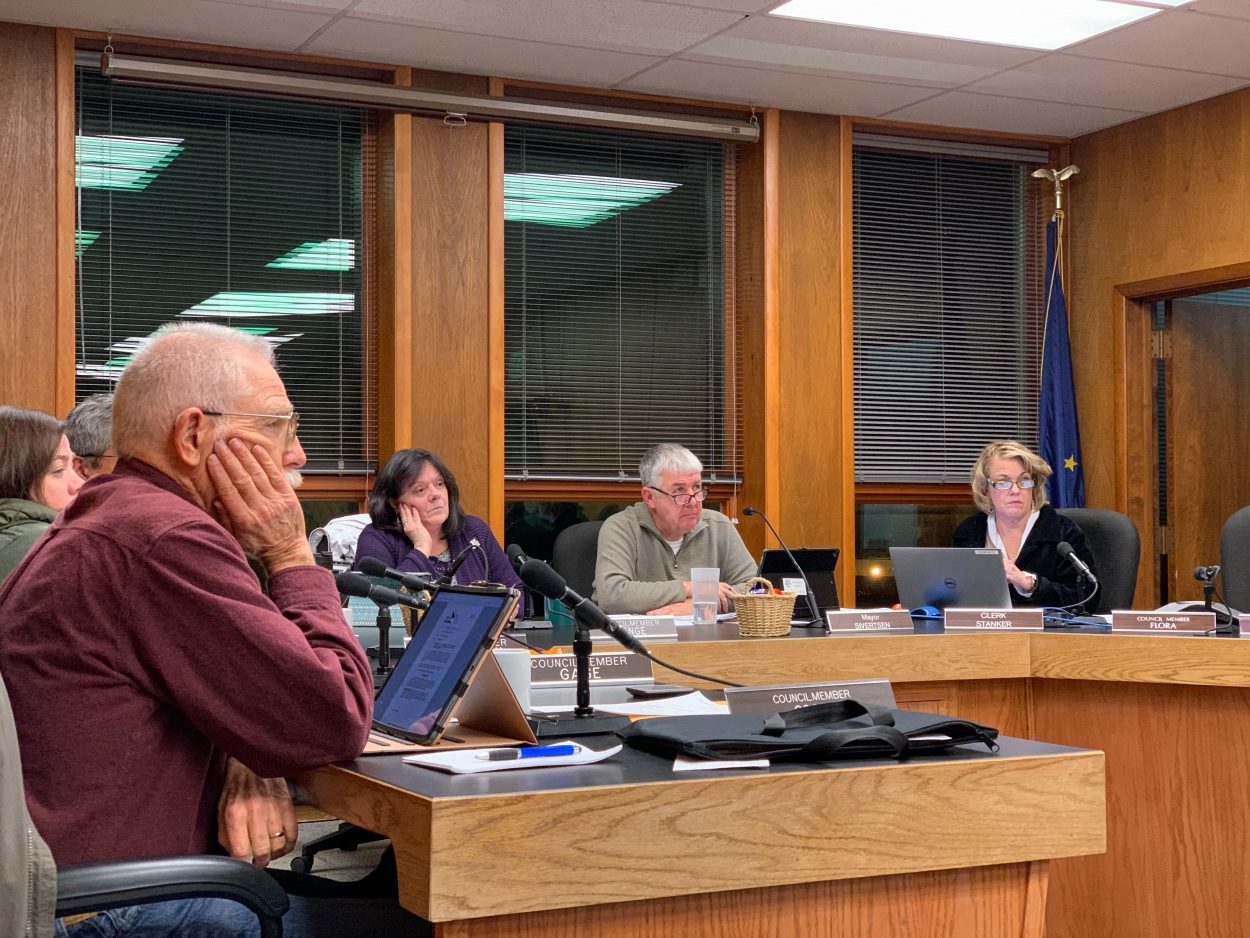
Debate over the Roadless Rule, the potential annexation of Ward Cove and water filtration dominated a busy City Council meeting Monday night
Ketchikan’s City Council threw its support behind the Trump administration’s drive to exempt Tongass National Forest from the Clinton-era Roadless Rule.
“I think it’s no secret the restrictions that are in place have had an adverse effect on our local economy,” said Councilmember Judy Zenge. “We need living wage jobs for the average person. We’re always told that we’ve sold out to tourism and that we need to diversify our economy. Option six at least starts getting us there.”
The rule adds restrictions to roadbuilding, logging and resource extraction in much of the Tongass. Successive governors and Alaska’s Congressional delegation have asked the federal government to exempt the nation’s largest national forest from the Roadless Rule.
It’s been a controversial process. Public input from inside and outside Alaska has been consistently in favor of keeping the rule in place. Alaska Native tribes have also objected to the move.
Ketchikan City Councilmember Janalee Gage says she’s worried that rolling back the Roadless Rule would harm subsistence activities.
“The thing that most people are worried about is opening it up and then having issues with no regulations, no oversight on people abusing the land rights and destroying subsistence ways of life,” she said.
Gage provided the lone no vote; the resolution passed 5-1 with Councilmember Dave Kiffer absent.
Other councilmembers pointed out that rolling back the Roadless Rule likely wouldn’t lead to much additional logging, since timber harvests are governed by the 2016 forest plan. That’s a policy document that outlines the Forest Service’s timber strategy in the Tongass. Forest service staff said at an early November public meeting that changing that forest plan would take nearly a decade and require extensive public input.
In other business, the council discussed annexing Ward Cove into the city.
Private developers have proposed building a two-berth cruise ship dock on the cove. The mayor and council have warned the city could lose head tax revenue with cruise ships docking outside city limits. The city’s already financed public docks which are being repaid with revenue from cruise traffic.
The council has commissioned a study on the issue due back March 31. Councilmember Mark Flora acknowledged that any decision on the issue is likely far in the future.
“But I’m going to unequivocally state I am absolutely against annexation,” Flora said. “The reasons are multiple. People live in the borough for a reason.”
Four North Tongass residents who might be affected by an annexation proposal spoke out against it during public comment. A few of them mentioned the former Shoreline Service Area north of downtown Ketchikan. That was annexed in 2001. They complained that Shoreline-area residents paid higher property taxes but city water and sewer wasn’t extended to the area.
City Manager Karl Amylon explained that property taxes don’t pay for water and sewer services. That’s a separate item that property owners pay for separately when they pay their utility bills. But he said Shoreline residents do get the same city services as downtown.
“We provide fire, we provide EMS, we provide public works, we provide police protection out there,” Amylon said.
Water filtration was another topic that generated considerable discussion at Monday’s City Council meeting.
Regulators put the city on notice earlier this month that it had exceeded federal standards for fecal coliform bacteria in its so-called “raw water.” That’s water in reservoirs like Ketchikan Lakes and Fawn Lake. It’s then treated before it flows through taps where city officials say it’s safe to drink.
But the fact that the city’s raw water exceeds standards means Ketchikan could be required to install a filtration plant. Early estimates run upwards of $70 million.
Where’s that bacteria coming from? It’s hard to say for sure. But city council members and staff alike have blamed climate change — warmer temperatures make it easier for bacteria to reproduce — not to mention a booming mountain goat population in the watersheds that drain into drinking water reservoirs.
Amylon said that because the treated drinking water remains safe, it might be time for state and federal regulators to lower their standards.
“If our situation is a result of climate change, then there are going to be a whole lot of other communities who are going to be facing similar sets of circumstances,” Amylon said.
In other news, the city’s historic firehouse will be put up for sale in a second auction. This time it’ll be with sealed bids with no minimum. That’s after the first attempt with a live auction garnered no takers. But Amylon clarified that the city would have the right to reject any low-ball offers.
The Council also unanimously passed a resolution asking British Columbia to better protect the Unuk River watershed from transboundary mine pollution. It also passed a 2 percent cost-of-living raise for the city’s nearly 80 non-union workers at a cost of a little more than $140,000.





